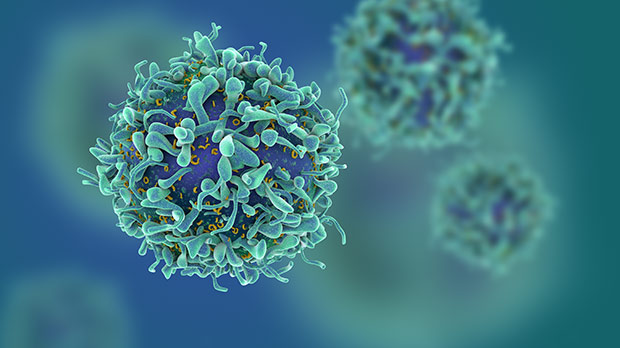
Immunotherapy works by helping the body’s immune system recognise and attack cancer cells.
There are several different types of immunotherapies, including monoclonal antibodies, vaccines, and, in this case, checkpoint inhibitors.
Checkpoint inhibitors block specific proteins on the surface of immune cells called T cells. Blocking these proteins help T cells to recognise cancer cells as abnormal, boosting the immune response against them.
But for this treatment to be effective, the T cells need to be able to infiltrate the tumour.
In a lot of cancers, cells called cancer-associated fibroblasts (CAFs) form a protective layer around the tumour, preventing the immune system from attacking it.
 100vw, 150px”></p>
<p class=) Professor Gareth Thomas
Professor Gareth Thomas
Led by Professor Gareth Thomas, researchers at the University of Southampton have found a way to prevent these CAFs forming, giving the immune system a better chance of targeting and killing the cancer cells.
“Immunotherapy for cancer has been a very exciting development but still doesn’t work in most patients,” said Thomas, a professor of experimental pathology.
“A lot of those patients will have tumours with high levels of CAFs, which are preventing the T-cells from reaching the tumours.
“If we can prevent this CAF formation, we can overcome immunotherapy resistance.”
Breaking the barrier
Fibroblasts are normal cells that form part of connective tissues in our bodies. When a tumour begins to grow, cancer cells hijack fibroblasts to become CAFs to protect themselves from the immune system.
That means that even when immunotherapy gives the immune system a boost, it can’t attack and kill the tumour cells because they use CAFs as shield.
Knowing that CAFs are the issue is a good start in overcoming the resistance to immunotherapy, but the problem is we don’t currently know how to stop fibroblasts being turned into these tumour-protective CAFs.
But thanks to this new research, that’s about to change.
Thomas and his team found that a protein called ATM, which usually regulates DNA repair in cells, controls the formation of CAFs when a tumour grows.
Therefore, by blocking the function of this protein, we can stop CAFs from forming and boost the chances of immunotherapy working successfully.
And that’s not where the good news ends: drugs that block ATM have already been developed for another purpose.
These drugs, called ATM inhibitors, were made to sensitise cancer cells to radiotherapy. Their potential to improve people’s response to radiotherapy is currently being evaluated in clinical trials.
That means that there’s no need for a long drug development process. Instead, we might be able to start testing the effects of ATM inhibitors combined with immunotherapy sooner rather than later.
“What’s really exciting about this is that we’ve identified a drug that already exists,” Thomas adds. “Companies have already developed ATM inhibitors for a different purpose, so we don’t need to spend time developing a drug and we could take this straight to testing.”
“We’re very excited about this.”
 100vw, 150px”></p>
<p class=) Shane with his wife Denise, daughter Molly and son Jack on Jack’s wedding day.
Shane with his wife Denise, daughter Molly and son Jack on Jack’s wedding day.
Shane’s Story
Shane McCormick, a father-of-two from Fair Oak, says he is proof that immunotherapy saves lives. The 47-year-old landscaper was diagnosed with melanoma in 2018 and received immunotherapy treatment when doctors discovered it had spread to his lymph nodes in 2019, just before Christmas.
“When I received my diagnosis I was so worried about my future but now I class myself as one of the lucky ones,” he says.
“Thanks to the immunotherapy my scans are clear of cancer. My wife Denise and I have just celebrated our 25th wedding anniversary and I was best man at my son’s wedding.
“It makes me feel quite emotional to think that other people may now get to have the same chance as me and be able to live longer and spend more time with their families.
“I ran the London Marathon three months after completing my treatment and do Race for Life and other challenges to give something back and support research like this. And this discovery is a medical marvel that will potentially save lives.”
Bringing benefits to patients
As the results, published today in Cancer Research, are based on findings in the lab, the team’s next step will be to develop a clinical trial that will see the research translate from bench to bedside.
But whilst it’s still in early stages, research like this, that offers key insights into how we might overcome resistance to immunotherapy, could lead to better chances for people undergoing these types of treatments.
“Research is a real roller coaster,” Thomas concludes, reflecting on the six-year study.
“There are lots of highs and there are also lots of lows. But when something does come together, you’re excited because you think perhaps it could make a difference. That makes it all worthwhile.”
Jacob





